Sustainable Denim Guide: It’s hard to believe that the fabric that originated in Europe half a millennium ago, and travelled to the United States to become a workingman’s item almost 150 years ago, has transformed into the single most important style item. Jeans have been a symbol of work and leisure, conformity and rebellion, the mundane and high fashion.
Unfortunately, they can also be the most environmentally harmful item in our wardrobes.
Let’s explore the history of jeans, their impact on environmental and human health, and their hopes for a sustainable future.
By Ellen Rubin
An Introduction: The Need for Sustainable Denim
The story of blue jeans is centuries old and spans the globe. People wear jeans in every country, multiple times a week. The average woman owns 7-10 pairs and men own 6. In many countries, such as Canada, jeans are worn almost daily.
Luckily, concerned farmers and innovators have discovered ways to make it more eco-friendly. Today, you can buy new, raw, selvedge jeans, those made from organic cotton, recycled fibers, upcycled pants, or deadstock fabric.
New technologies make it possible to purchase just produced jeans that have been distressed without the use of harsh or toxic chemicals, excessive water use, or destructive abrasion techniques. Each of these innovations and re-incarnations of former practices will be analyzed for their strengths and weaknesses.
With so many options in fabrications, manufacturers, prices, and styles to choose from it may be overwhelming to find a brand, let alone a pair a jeans, that you want to add to your wardrobe.
Luckily, 35% of all jeans produced today use more sustainable practices so it’s easier to find sustainable jeans. However, we’ll examine and dissect each of these areas to give you a starting point in your search for that perfect style, price, and size jeans.
The Environmental Impact of the Jeans Industry
The term “dirty jeans” has a different meaning when it comes to sustainability. Manufacturing of a pair of jeans is often the most polluting of any item of clothing. It starts with the cotton, which uses more water, insecticides (in fact 16% of all insecticides used), and fertilizers than any other fiber to produce.
Processing the cotton into yarn, and then spinning and weaving it uses more water and energy.
It takes around 1,800 gallons/6,800 litres of water just to grow enough cotton to produce a single pair of jeans and 3% of all arable land in the world is devoted to cotton growing.

Manufacturing a pair of jeans uses 2,900 gallons/11,000 litres of water.
Because the manufacturing process is so wasteful, many manufacturers are fixated on reducing the amount of water required and pride themselves on how many gallons/litres of water they save per pair. Many announce their savings right on product pages.
Because synthetic indigo dyes are toxic – even carcinogenic – preventing the dye from escaping into environment is also a high priority. More and more manufacturers are processing and recycling their waste water and switching synthetic traditional dyes for those that are non-toxic.
Creating fashion jeans involves the use of processing equipment to create washes, and distressing that uses abrasive compounds. These are harmful to the environment and workers alike. Furthermore, embellishments and the advent of stretch jeans meant that jeans were no longer pure cotton, so they weren’t recyclable or biodegradable.
Not only is producing denim particularly harmful to water sources, but each pair of jeans sheds 56,000 microfibers per wash.
Usually people are concerned about plastic nano-particles, but cotton, and especially denim, nano-particles are making their way through the waterways and accumulating in places like: the Arctic Ocean, our soils and foods, and even on mountaintops.
With an estimated 5 billion pairs of jeans produced globally every year, the pollution is astronomical.
Companies concerned about the environmental impact of fashion have created processes that eliminate the worst side effects of denim production. Some weave denim fabric, others create machinery to process it, and still others manufacture the finished product. Eco-friendly practices occur at each step in the process.

Moves Toward Sustainability
The Ellen MacArthur Foundation develops and promotes the idea of a circular economy. They are currently working with a growing number of textile mills and clothing manufacturers to implement circular principles into their business plans.
They have created The Jeans Redesign project that specifically targets denim and jeans manufacturers. Over 70 leading brands, manufacturers, and fabric mills are using the Jeans Redesign Guidelines of minimum requirements for durability, material health, recyclability, and traceability that were set out by over 80 denim experts.
Knowing that a company is working with the Foundation is a sure sign that the goods they’re producing are sustainable.
Companies featured in this article that are part of the project include Organic Basics, Wrangler, Lee, Atelier & Repairs, Boyish, DL 1961, Frank and Oak, Mud Jeans, Outland, Outerknown, Reformation, and Tommy Hilfiger and fabric mills Crescent Bahümán, Cone Denim Mills, and Saitex.
The Origins of Denim
Modern denim traces its origins to Genoa, Italy in the 1600’s.
Bleu de Gênes was a sturdy, indigo-dyed cotton fabric – and is the origin of the term “blue jeans”. Weavers in Nîmes, France created a heavier, twill woven fabric, that they called “serge from Nîmes” or “serge de Nîmes”, a phrase that evolved into the word “denim”.
The fabrics were used to make durable, low-cost clothing for the working classes of northern Italy, and was shipped throughout northern Europe.
Levis’ Arrival On The Scene
In the 1860’s, Levi Strauss, a German immigrant, capitalized on the Gold Rush by providing goods to miners. He created “waist overalls” in a heavy canvas material normally used for tents.
The fabric was durable, but not comfortable or flexible, so he switched to using denim which was already popular in France for its durability, quick drying time, and the ability of the dark blue color to hide stains.
Synthetic indigo also made it affordable. Stylistically, the inspiration was Genoese sailors who wore a loose-fitting pant with a flared leg that could fit over heavy work boots. Between the cost, comfort, and durability, the pants became a favorite with factory workers, ranchers, farmers, and miners.
The final step toward becoming modern-day blue jeans was when Strauss and his partner/tailor Jacob Davis added copper rivets to the stress points of pockets and the bottom of the fly, as well as adding stitching on the back pockets. This was especially important for miners who needed the added strength to support their gold finds in the field.

501’s and the Introduction of Wrangler
The duo were granted US patent no. 139,121 on May 20, 1873.
The leather patch on the back, which depicts two horses trying to rip a pair of jeans apart, was added in 1886, and the red tab on the left rear pocket was added in 1936. This registered trademark allowed the jeans to be identified as Levi’s at a distance and is the first type of designer jean branding.
Taken altogether, these are the original 501 jeans that are still being manufactured by Levi’s today.
While Levi’s were the original blue jean, H.D. Lee Mercantile Company started producing jeans in 1898, and the Western Garment Company (WGC) was formed in Edmonton, Alberta, Canada in 1911. In 1962 Levi’s purchased WGC.
The next player in the market was Wrangler ‘authentic western jeans,’ appearing in 1947 to appeal to rodeo cowboys. Their growth was exponential and, by 1996, 20% of the jeans sold in the US were Wranglers.
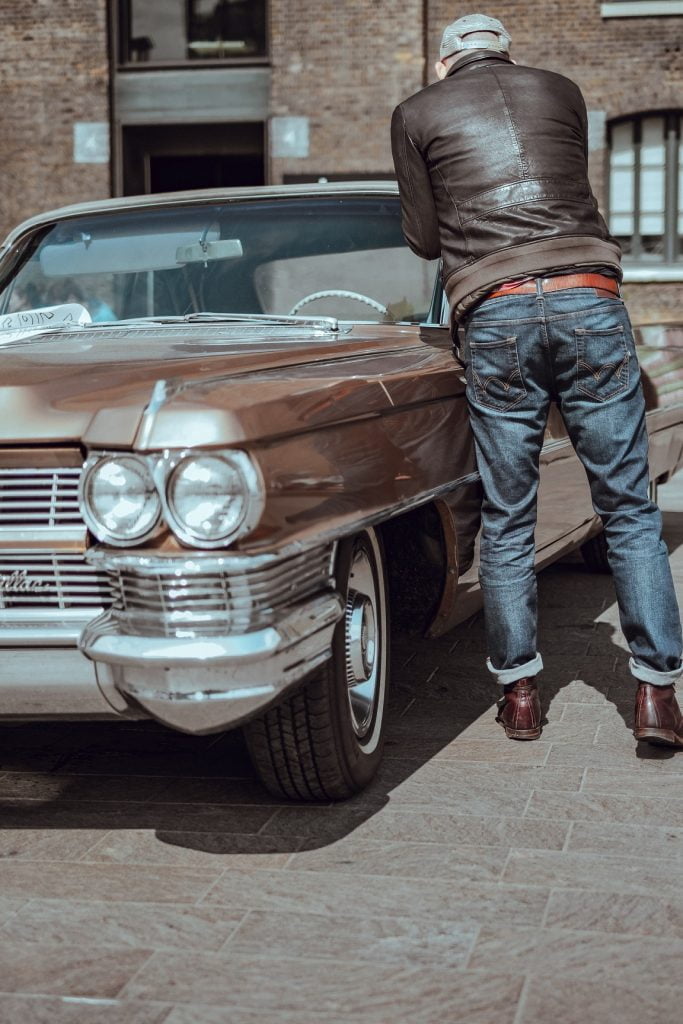
The History of Denim Fashion
Blue jeans styling remained stagnant for about 100 years. They were an integral part of living, but they were work clothes that never changed, especially in the American West, even when other manufacturers joined in, most notably Wranglers and Lee.
Though, Hollywood included jeans in their depictions of the Old West, the step from work wear to casual wear came after WWII when they were marketed to returning servicemen as an alternative to their work suits for vacations and weekends. The styling was the same, but their purpose changed.
From Workwear to Fashion Statement
This is how it remained until jeans became mainstream and something more than just workwear.
They started evolving, and often came to represent rebellion. Styles went through fads that usually overlapped and included bellbottom, flared, bootleg, skinny or baggy fits with low- mid- and high-rise waists that may be frayed and patchwork.
At times stretch or non-stretch have been popular. Right now, we seem to be at a crossroads where style influencers and icons are undecided about what is “in”. The result is that manufacturers are producing just about every combination of fit and style available. If you have a favorite, you can probably find it new or vintage.

Style Evolution and Key Fashion Icons
Jeans went from conservative/casual workwear to cool/anti-establishment wear epitomized by the likes of James Dean and Marlon Brando in the 1950’s. When movies showed them wearing cuffed, boxy styles, school boards started to ban students from wearing them to class.
Even though the meaning behind wearing jeans shifted, the general style remained the same until a ground-breaking move by manufacturers. Though jeans had never been specifically for women, this changed in the 1950’s, and then jean culture exploded. By the end of the 1950’s, jeans were being worn by 90% of American youth.
The 1960’s saw the first major shift in style. Bellbottoms and low-rise jeans became fashionable. This was a call for less structured clothing, more freedom, and self-expression. Denim moved from exclusively a bottom fabric to being used for jackets, skirts, dresses, and shirts. Great examples of the style are Jimi Hendrix and Janis Joplin. Today, Harry Styles has often been seen in similar styles.
Self-expression through denim evolved in the 1970’s to embrace slimmer looks with straighter legs – a move from bellbottoms to flared. Farrah Fawcett’s posters are a prime example of the style. The 70’s were also the beginning of short-short cut-offs, a la Daisy Dukes.
Embroidery, patches, and painting were all part of the self-expression that denim allowed. No one exemplified this better than Fred Segal, who started making jeans in lighter weight denim and adding rhinestones and customized touches to appeal to his celebrity clientele in Los Angeles. This was the entire foundation of his California stores.
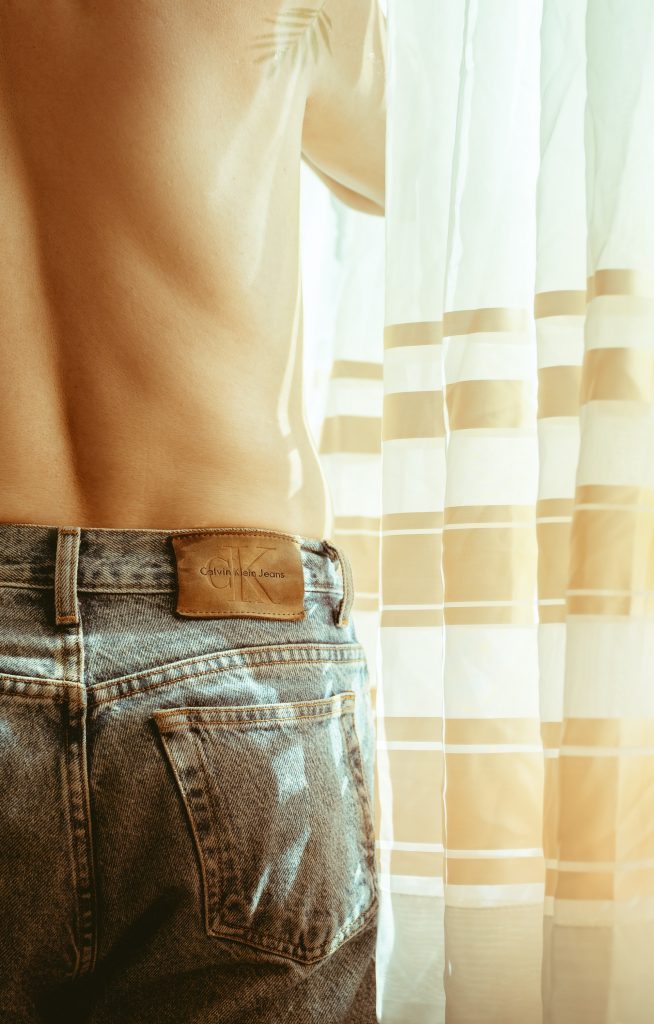
The 80’s and 90’s
The 1980’s brought the rise of “designer” jeans with the popularity of Calvin Klein, Vanderbuilt, Jordache, and eventually Guess jeans. Models included Brook Shields (“No one gets between me and my Calvins”).
Instead of fading occurring naturally through long and hard use, stonewash, acid wash, and distressed jeans became popular. Fading wasn’t a sign of old jeans anymore, but a sign of “designer” jeans. It wasn’t what you wore, but who you wore that became important.
As jeans became a fashion statement, skinny jeans (inspired by punk culture) or jeans with very narrow ankle openings (barrel legged) became popular. In fact, it was often necessary to lay down before you could zip your pants up. Another example of the fit is a very young Courteney Cox in the Bruce Springsteen video of Dancing in the Dark in 1984.
The 1990’s saw the rise of two equally popular but diametrically different styles: skinny jeans reverted back to straight-legged, and baggy denim emerged with the popularity of grunge and hip-hop. The grunge look was epitomized by Kurt Cobain with straight, loose fitting jeans that were ripped.
Another early example is Alan Jackson in the video for Chattahoochee. His jeans were straight with a bootcut bottom, yet faded and ripped. The hip hop street look could be all-over denim, big, and baggy (i.e. JNCO jeans).
Today, this style can be seen on Billie Eilish. Looser fitting denim also borrowed and stylized modern workingmen’s looks with carpenter’s pants (multiple pockets, loose fitting, and a loop for hammers) and overalls (long or in shorts versions).
Modern Style, Retro, and Vintage
The turn of the century brought back the 70’s looks of ultra low-rise jeans, flares, bootcut, and even patchwork jeans. (Picture Britney Spears and Justin Timberlake in their matching patchwork denim dressy outfits.)
Today, you can see Bella Hadid sporting low rise jeans. Capri length was borrowed from the late 50’s and early 60’s. This is also when the next incarnation of “designer” jeans emerged with the advent of premium jeans. The price point wasn’t tied to a single designer, but rather a label like Citizens of Humanity.
The next fashion evolution was to embrace vintage jeans. Skinny jeans became even skinner – made possible by technical advances and the popularity of stretch denim. In a nod to comfort, the jegging was born.
Now, fashion experts are predicting that the skinny jean is giving way to looser, baggier, and even barrel-shaped jeans. They believe it is a consequence of the pandemic and people wanting to be more comfortable in their clothing, or to accommodate weight gain.
What goes out of fashion, always comes back around. Every 20-30 years, we rediscover a fit or look that suddenly seems fresh again. This is part of the reason, in addition to those who are concerned with sustainability, why vintage clothing is so sought after right now. Not only are the styles back in, but the clothing as character.
If nothing else, today, you can wear just about any style of denim, from skinny to baggy, low rise to ultra-high rise, straight leg or bell bottom and still be in-fashion. 10 years ago, the children that would cringe if they saw their mothers in high-waisted mom jeans are now purchasing new mom jeans, or even finding vintage.

How Denim is Made
Warp & Weft
When looking at a piece of fabric, the vertical threads are called “warp” and in denim these are a natural color.
The horizontal threads are “weft”, and these are dyed indigo. The difference in thread color is the reason the inside of jeans is much lighter than the surface. The weaving process has individually fixed warp threads and a continuous weft thread that weaves in and out. When the end is reached, it’s turned to start the next row.
Older looms, or shuttle looms, that the denim was made on, were 36” wide and required a great deal of manual attention from the weavers. The advantages are that the edges are finished (selvedge), and the fabric, while more tightly woven, is actually softer. Shuttle looms also make it possible to create different fabric looks, including a hand-made look.
Selvedge
The word “selvedge” is a derivation of “self edge”. Both edges of the loomed fabric are finished rather than having a frayed edge. Originally, all jeans were selvedge jeans.
Yarn Dyeing
Denim generally isn’t dyed after it’s been created; rather, the thread itself is dyed before it goes into creating the fabric (this is called yarn dying).
The Projectile Loom
When jeans became so popular that shuttle looms couldn’t keep up with demand, the industry moved to projectile looms.
A bullet shaped projectile with a single thread replaced the shuttle that was passed back and forth. Now, there were frayed edges because each row was a separate thread. The advantages included a 60” width, increased speed, uniform fabric that was less expensive and much faster to produce, and machinery that required much less manpower due to automation.
Many of the original shuttle looms were sold to Japanese companies who appreciated the artistry that could be created in the denim, didn’t mind the manpower requirements for production or maintenance, yet allowed them to meet the booming Japanese market for denim.
There are still a few shuttle looms in use by American companies, but a large proportion of selvedge denim is Japanese.
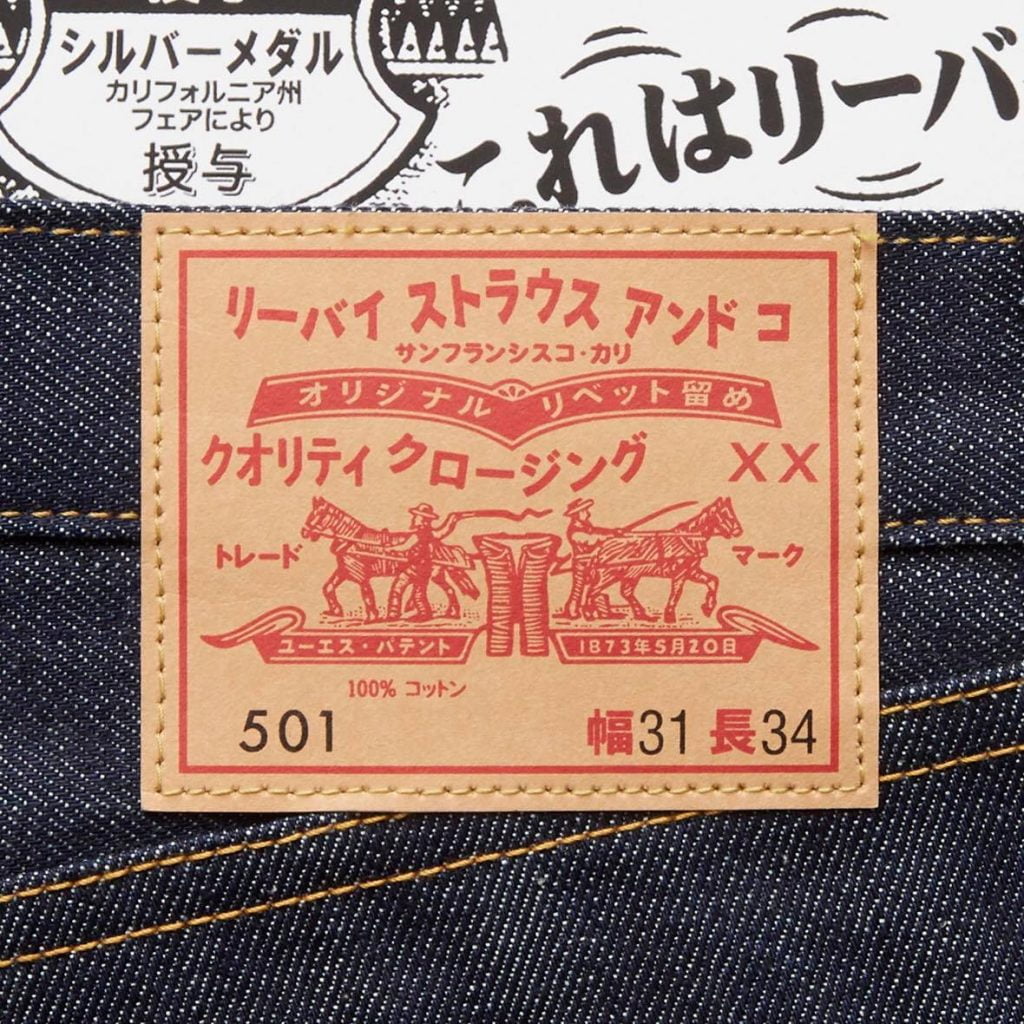
Thread Color
It’s possible to identify selvedge jeans by looking at the outside edge of the pant leg. If there is a finished, light border, often with an identifying thread stripe of color, the denim was made on a shuttle loom. There are some imposters out there who finish the bottom part of the pant leg to mimic this, but if you look higher up the pant leg, the edges won’t be finished.
Original Levi’s 501 jeans had a red stripe and were made at Cone Mill’s White Oak Plant in North Carolina. This is true even today. The mill changed the red to blue or green when making denim for Lee’s jeans, and a yellow thread for Wrangler’s jeans. If you decide to buy new selvedge, or hunt for some choice vintage pairs, this will help you in your search for authenticity.
In addition to Japan (the leading producer and the leader in fashion forward jeans), and the US (2nd), China, India, and Turkey have begun producing selvedge fabric.
Their cost of production is lower, although that doesn’t always translate into lower costs for the consumer. If you are looking to purchase selvedge jeans, don’t rely on cost alone to determine quality and sustainability…pay attention to where the fabric was milled and the jeans were produced.
Raw Jeans
“Raw” or “dry” jeans refers to the practice of not washing or processing the fabric or completed jeans before they’re sold. The fabric is crisp, deeply colored, and even stiff. Raw jeans can be made from selvedge or projectile loom denim.
There is a group of hard-core “denim-heads” that advocate for raw denim. They are purists and discuss how long you should wait before ever washing your jeans (it ranges from weeks to months, even years), and what is an acceptable way to wash them, (No, just throwing them in the washing machine isn’t one of the options!)
The process of dying raw denim is also slightly different. Instead of soaking the yarns in a dye bath, they are stretched on a 2-story machine that repeatedly dips the threads in an indigo dye bath and then lets them oxidize to adhere to the cotton yarn while sending it to the top of the machine.
Raw jeans will end up telling the story of how you wear your jeans by the eventual white crease marks, fading, and wear sections as the outer indigo is washed or warn away and the white center of the thread is exposed.
Until you wash or break-in your raw jeans by wearing them for several weeks or months you can expect the indigo to color your skin, furniture, or the other clothing you’re wearing. To enthusiasts, this is part of their charm.
If you want to buy raw denim, be aware that sizing can be a bit difficult. Because they haven’t been pre-washed (sanforized) or preshrunk, they can shrink as much as 10% after the first washing. Pre-washed jeans shrink less than 1%. Skinny jeans, especially raw selvedge skinny jeans, don’t fit all thighs – they’re just made extra skinny.
Make sure you get measurements of jeans before purchasing because manufacturer’s sizing is not always accurate.
Luckily many of the brands listed below give multiple measurements and other ways, including unlimited exchanges and made to measure, to help you find the correct size.
Denim Manufacturing Around the World
Producing sustainable jeans really starts with how you grow the cotton. Next up is producing the fabric. Few jeans brands actually weave the fabric and sew the jeans themselves. Fabric mills are the ones truly producing the denim, so while you probably won’t know their names, you may be wearing their denim, because they sell to some of the largest brands.
Even if the jeans maker is not recognized as being sustainable, you’ll know that the fabric, at least, has been sustainably sourced. It is much like starting with organic cotton – if the foundations of your clothing aren’t sustainable, especially when it comes to the most polluting portion of production, then the end-product won’t truly be sustainable.
A List of Denim Manufacturers

Pakistan is becoming a hub of sustainable denim manufacturing. Crescent Bahümán Limited is a Pakistani company founded in 1995 that manufactures denim that is both sustainable and ethical.
They are vertically integrated and aligned with the UN Sustainable Development Goals. Not only is their fabric eco-friendly, but the entire facility, including weaving, dying, power plants, water treatment, and housing, is green.
They produce over 10 million pairs of jeans annually. They recycle 236 tons of post-industrial waste and 210 tons of post-consumer waste annually. They will soon make 80% of their fabric with recycled materials.
They are Cradle to Cradle Certified, measure their environmental impact using software by Jeanologia, and are experimenting with alternative source material such as hemp and recycled fibers such as Repreve.
They have patented a dying process for laser-optimized fabrics for flawless wash effects without using. They are adamant about preserving water and have developed an “Aqua save” dying technique that preserves almost 80% of the water used in the fabric-wash stage which is reused in their power generation processes. They use fresh water only for chemical solutions.

Interloop is another Pakistani company. Their denim plant has LEED V4 Platinum Certification, the highest standard available.
Their laundry operates on water reuse technology by reducing dye-to-fiber ratios and putting them through shorter wash cycles allowing for a 70% water savings. They are constantly reducing their carbon footprint and have signed up to the UN’s Race to Zero emissions reduction campaign.
Their efforts for ethical treatment of employees include Fair Trade USA and UN Women certification.
They support local cotton farmers by building a secure supply chain and improving working conditions. They also contribute to the Organic Cotton Accelerator program. Even though you don’t see the Interloop name while shopping, you may be purchasing their clothing if you buy Nike, Adidas, Target, or Diesel clothing.

Saitex is based in Viet Nam. While you may never have heard their name, you may have purchased one of the 3 million pairs of jeans they make yearly for Outerknown, Tommy Hilfiger, Ralph Lauren, Gap, Madewell, Everlane, Calvin Klein, Banana Republic, Paul Smith, J Crew, or Atelier & Repairs.
They manufacture 20,000 pairs of jeans every day. They use only 1.5 litres of water for the rinse process instead of the normal 80 litres. This saves 430 million litres of water per year. They also recycle 98% of their water, replaced stone washing, sandblasting, and air dry their pants to cut energy use by 85%.
They have engineered a laser system that etches a fine layer of fiber and color to distress jeans. Not only does this cut down on toxic practices and water use but reducing the process from 20-30 minutes to 90 seconds.
They are the first, and currently the only Asian denim factory to be B Corp certified. They are also bluesign, Fair Trade, LEEDs, OEKO-TEX Standard 100 certified.
They combine high-tech production with a true concern for the people in their community. They use robotics to increase efficiency, yet also have a production line (Rekut) that has no barriers to enable people from disadvantaged backgrounds an equal opportunity. They receive training and support that enables them to earn a stable income making them self-sufficient.
Saitex also supports 4 orphanages and provides training and job opportunities to the children when they turn 18. They have a hydroponic clean farm that produces enough food to feed their associates. Waste materials are made into building blocks and tiles for low-income housing projects. Overall, Saitex has created a company that cares for its employees, community, and the planet.
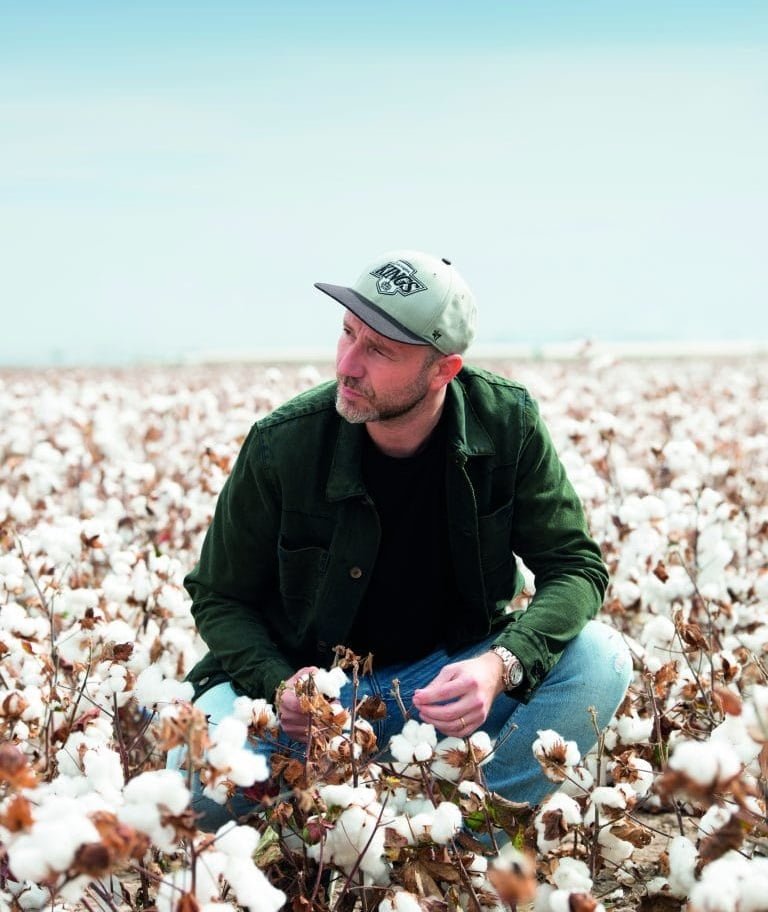
Candiani is a family-run Italian company founded in 1938 in a small town near Milano. They have grown to become “the world’s finest and most sustainable denim mill creating the fabrics that give birth to the Premium Denim Industry.”
They have always made fabric for the workingman’s clothing, but started focusing on denim in the 1970’s. Their watchwords are reduce, re-use, and recycle.
They are ISO 1400, SA8000, GRS, GOTS, and OEKO-TEX certified. Most notably, they have the exlusive use of Kitotex® and SaveTheWater® technology which drastically reduces the consumption of water, chemicals and energy in fabric production. The technology uses “chitosan”, a polymer derived from recycled exoskeletons of shrimp and mixed with indigo juice.
The polymer, used in the dying process, increases efficiency by using 30% less energy, 50% less water, and 70% fewer chemicals. Unlike the normally used PVA, chitosan is fully biodegradable and even helps purify discharged water. It also has anti-bacterial, anti-static, and anti-mite properties that benefit the consumer.
If you are looking for a sustainable stretch denim, they make their Coreva Denim with naturally sourced rubber. Candiani supplies the denim for the Custom Made Jeans Company based in The Netherlands (bespoke jeans). Other companies that use Candiani denim are Levi’s, Lee, Lucky Brand, Hugo Boss, Mott & Bow, J Crew, Madewell, and Outerknown.

Jeanologia, a Spanish company, manufactures eco-efficient and sustainable finishing machines for the fabric industry, such as their laser processing equipment. Not only do they enhance productivity, they reduce water needs up to 90% which translates into keeping 494 million cubic feet of water from being polluted last year alone.
The machines also reduce energy consumption and eliminate damaging air emissions and waste. They guarantee zero contamination.
Today, 35% of the jeans worldwide are made using at least one of Jeanologia’s machines in countries such as Bangladesh, Mexico, Pakistan, Turkey, and Vietnam. Their laser technology works by scratching the surface of jeans to create a worn-out, distressed look without using toxic, time and resource-heavy methods. An additional benefit is that each pair of jeans can have identical markings. Many of the jeans brands explored below use their laser technology.
Other Jeanologia machines can mimic stonewashed jeans without pumice stones, chlorine, or industrial washers. Water and chemicals are replaced with ozone gas which bleaches the denim. Instead of using 100 litres of water per pair, only 30 litres is necessary.
This machine is often paired with their Airflow device which uses 1 million tiny air bubbles per cubic centimeter of water to “wash” jeans. The air bubbles surround the jeans as the machine spins the garments. The air bubbles efficiently carry chemicals away further reducing the water used to 10 litres a pair. Used water is then filtered and reused. Emissions are drastically reduced because you don’t need to dry clothes or heat water for mixing chemicals.

Cone Denim Mills has been manufacturing fabric in Greensboro, NC since 1891. In fact, their Cone Deeptone Denim™ which they started making in the early 1900’s is still available today.
They also offer performance, stretch, selvage, and natural indigo denims, as well as performance fabrics that include their S Gene® technology for superior stretch. Their Sustainblue™ collections are focused on sustainable ingredients such as pre- and post-consumer recycled cotton, Tencel blends, and S Gene® with Repreve® recycled polyester.
In addition to using natural indigo, they also use Distilled Indigo which has hydrosulfite-free and analine-free dyes. The natural indigo they use is USDA certified bio-based from a company in Nashville, TN which has been selling to them exclusively since the late 1800’s.
Using a new power generation system with thermal energy capture capabilities, they have reduced their greenhouse gas emissions 26%. In 2018 they redirected 1.1 million pounds of waste from landfills by recovering and re-introducing fibers back into their fabrics.
They are leaders in innovation in their yarn and construction characteristics to improve the strength and durability of their fabrics, creating colors that retain their tones, and flame-resistant denim.
They are also partnering with Cotton Incorp for their denim recycling program which converts used denim into insulation. A portion of this is distributed to help building efforts across the US. They also give back to their community through summer camps and scholarships as well as planting trees, renovating schools, supporting the elderly, disabled, and a local girl’s orphanage.
They partner with Jeanologia and are certified OEKO-TEX Standard 100, Recycled 100, Higgs Index, ZDHC, Better Cotton Initiative, and Cotton Leads.
Our Complete List of Sustainable Jeans Brands
If you are looking for a size outside the normal range (big & tall, petite, curvy or just larger sizes, i.e. men’s 40), the following companies may be a good place to start: Levi’s, Wrangler, Tommy Hilfiger, Warp + Weft, DL1961, Mott & Bow, Outland, Prana, Madewell, and of course made to measure Lasso, and Unspun.
The Originals
Levi’s

Levi’s is the original, and still innovating. They have an amazing number of styles and washes to choose from. Yet they don’t rest on their laurels but continue to focus on new fabrics and processes that have made them more sustainable. They treat their workers fairly, are focused on environmental enrichment from farm education through the finished product. The original 501 jean is almost 150 years old, still going strong, getting better and more sustainable.
- Pricing, Sizing & Customers: Pretty much cradle to grave. Waist sizes range from 23-66, length from 25-40 (including Big & Tall). For women they offer plus sizes in 14 – 26 in short, medium, and long. Big Boys go from 4-20R, Big Girls from 7-16. There are little boys from 4-7X, little girls from 4-6X, Toddler 2T-4T and baby starting at 12 months. Their pricing starts under $60.
- Styling: Among the sustainable fabrics available are WaterLess, Recycled Polyester, Repreve®, Sustainable Soft with ECOVERO, Sustainable Soft with Tencel Lyocell, organic cotton, cottonized hemp, recycled cotton, and recycled elastane. You can choose from cropped, Hi-Ball Roll, Jogger, or Western styles. Fits include straight, skinny, taper, slim, super skinny, bootcut, and ribcage. In addition to their original 501’s they have 7 other styles in high and mid-rise. Colors include black, blue, brown, dark wash, green, grey, and khaki as well as camouflage, and striped. There are stretch and non-stretch versions, Eco-Ease, Levi’s Flex, and Levi’s Sculpt. Pretty much, if you can envision it, they make it.
- Transparency & Sustainability: Levi’s no longer uses any PFC’s in their clothing. Their Re:newcell collection uses CIrculose™ which contains 50% recycled denim and 50% sustainably-sourced viscose. Their WellThread™ Collection includes 20% post-consumer scrap denim waste combined with their Water<Less technology that replaces 11 gallons of water with stones to soften the fabric.
- Recycling: There are several recycling programs that Levi’s participates in. You can drop off any brand of jeans at their stores and you will receive a voucher for a discount. Levi’s SecondHand will accept your old clothing and give you a gift card for their value. Their Tailor Shop experts give customers advice about repair, up-cycling or recycling their clothing including embellishments. If you don’t want to embellish your own clothing, shop at their SecondHand page where returned and vintage clothing is upcycled and resold.
- Causes Championed: Levi’s funds many programs that better their employees and the community including LGBTQ+ communities, teaching farmers new methodologies to improve farming practices to save water and reduce chemical usage, and The Levi Strauss Foundation that advances worker’s and human rights.
Wrangler

Wrangler® is known for their workwear jeans. Originally founded in 1904, they appealed to the western rodeo and cowboy market. The company is headquartered in North Carolina, and the parent company also owns Lee Jeans. Both Wrangler and Lee are affiliated with the Ellen MacArthur Foundation to help them meet their sustainability goals.
- Pricing, Sizing & Customers: Their jeans start at $29 and men’s comes in sizes 25-66, with lengths ranging from 28-44. Women’s jeans come in 00-33, plus sizing goes from 18W-26W with lengths from 26-38 and average, short, and tall fits. Boys sizes range from baby through boys 8-20 and include husky. Girls range from baby to size 24. There are Wranglers to fit everyone in the family.
- Styling: There are 14 men’s styles to choose from, each coming in 2-3 colors. Choices are a combination of classic, loose, original, regular, relaxed, skinny, slim, and straight fits with high, low and mid rises and leg styles that include bootcut, fits over the boot, straight, and tapered. Women’s styles come in low, mid and high rise with leg styles in bootcut, fits over boot, flare, skinny, straight, tapered, and wide. There are 8 different collections to choose from. Their denims come in stretch or non-stretch versions and in various fabric weights/thicknesses.
- Transparency & Sustainability: Wrangler has developed a new dying process Indigood, which uses foam to eliminate the need for water and cuts energy waste by 60%. They use recycled denim and recycled PET for their eco stretch fabrics. Their goal is to use 100% sustainable cotton, 100% renewable energy and clean chemistry by 2025, and have an overall reduction of water usage by 2030. Their site indicates which styles are currently sustainable. They meet the California Transparency in Supply Chain Act of 2010.
- Causes Championed: While many of the organizations and events they sponsor are Rodeo oriented, they also have partnerships and grassroots relationships with other organizations.
Family Brands that sell Blue Jeans
Patagonia
Patagonia is well known to be one of the most sustainable companies for just about everything for everyone – including jeans. They don’t have much variety in jeans, but if you are a die-hard Patagonia fan for their durability, ethical, conscious, and eco-friendly sensibilities, you will be able to purchase your jeans through them. Some are certified Fair Trade and they use water and energy-efficient indigo dying practices.
Tommy Hilfiger
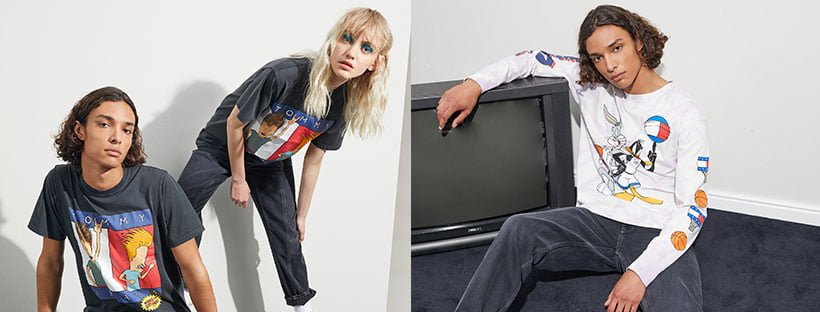
Tommy Hilfiger offers a wide array of jeans – some are now sustainable. Working with the Ellen MacArthur Foundation, they have launched the Jeans Redesign program (5 jeans styles and 2 denim jackets) to make the jeans more durable and recyclable; the end goal is circular design. Buttons are detachable, metal rivets have been replaced with bar tacks, and metal zippers have been removed. They are currently producing more than 2 million pieces of lower impact denim. There site distinguishes those styles that are more sustainable. They are one of the first companies to use 100% recycled cotton on a large scale.
- Pricing, Sizing & Customers: The entire family with pricing starting at $99 for adults. Men’s sizing goes from 28/30 to 50/30 or 48/36. They do carry big and tall. Women’s sizing goes from 25/28 to 33/32 and includes the Tommy Curve Clothing collection which is their plus size in 14-20.
- Styling: Cuts come in skinny, slim, straight, and regular for men with relaxed added for women. Men’s styling includes deep wash, distressed, and even a sustainable acid wash. Women’s jeans come in mid, high, and ultra-high rise with legs that are tapered, cropped, straight, boot or flare in a variety of washes and colors. Their fabric is either organic or recycled cotton. Their jeggings are made with organic cotton, elastomultiester, and elastane.
- Recycling: They have launched Tommy for Life, a circular business model where they take back items from their customers and partners – clean, repair, and resell them.
- Causes Championed: Their program “Make it Possible” is based on the premise that they should waste nothing – fashion should be fully circular and carbon and water footprints should be limited – and they welcome all – total inclusivity.
Warp + Weft

Warp + Weft prides themselves on producing the best fitting jeans that are size inclusive for the entire family. Their offerings are expansive and their prices reasonable. The family owned company is ethical and sustainable. Warp + Weft is owned by DL1961.
- Pricing, Sizing & Customers: Men’s sizing (28-42/30-32) and includes big & tall (44-48/34-36) Women’s sizes range from 00-24 (24-44”), as well as petite, tall, and maternity. Children’s has toddlers (2T-7T), girls (7-16) and boys (8-18). Adult jeans start at $74. Because they are vertically integrated and mill their own denim, you get premium jeans for a very reasonable price.
- Styling: Men’s basic styles include skinny, slim, straight, and chino. Women’s include skinny, straight, wide leg/bootcut, jumpsuits and overalls. They create 4 core fabrics: Dynamic, Oneder, Power, and Classic that range from shaping stretch to soft classic cotton.
- Transparency & Sustainability: Each page has an extensive sustainability report with water saved, the percent of fabric made from recycled denim, plastic, and/or cotton, and has a button on the page if you wish to donate to a particular charity. In producing their own denim, they source their cotton, lycra and Tencel in the US, their dyes in Europe, and use a proprietary cotton wrapping technique. They rely on Dry Ozone technology to help reduce the amount of water needed for each pair to less than 10 gallons and avoid harmful bleaching processes. They also recycle 98% of the water they use. They are committed to ethical practices, fair wages, reasonable, hours, and positive working conditions for all their employees. They use HeiQ in their fabrics, an antimicrobial agent.
MUD Jeans

MUD Jeans is a Netherlands company founded with the goal of circularity for jeans. All their products contain either organic or recycled cotton. In addition to outright sale, they’ve pioneered a jean leasing program where you pay a leasing fee for 12 months after which you either own the jeans or can swap them out for a new pair. They will then either be upcycled as vintage jeans and resold, or the fabric will be recycled into new pairs for sale or lease. They have retail stores in Europe, the US, Canada, and Japan as well as online sales.
- Pricing, Sizing & Customers: Men’s sizing goes from 28/32 to 36/34 and women’s from 25/30 to 33/32. Pricing starts at €119 (leasing from €9.95 per month).
- Styling: Men’s styling includes fits that are tapered, loose, straight or slim. Their fabrics come in different weights and combinations of recycled/organic cotton, and either stretch or non-stretch. Women have the choice of skinny, flared, straight, or loose fits. Colors include black, gray, and a spectrum of blues. Current styles are either mid- or high-waisted. Overalls are also available.
- Transparency & Sustainability: They have eliminated PP spray and use Cradle2Cradle indigo dye. Their laundry recycled 95% of its water through reverse osmosis. Their paper tags are OEKO-TEX certified. They rely on a short supply chain, have denim experts in the factories they use to make sure workers earn above a minimum wage. GOTS monitoring ensures that farmers work under safe conditions. Their site lists the amount of water saved, CO2 emissions avoided, land preserved, and jeans (20,000) kept out of landfills or incinerators over the past 4 years. They also have an extensive sustainability report available. Some statistics to be proud of are the fact that their emissions or 70% less than the industry average, and they use just 8% of the water traditionally needed. The company, overall, is carbon neutral, and working towards being carbon positive.
- Recycling: Their innovative leasing program is almost 10 years old. Their jeans contain 40% recycled denim. They’re working toward a collection made from 100% post-consumer recycled denim. They also offer a repair program.
- Causes Championed: To share their dedication to, and experience with, circularity the company hosts monthly Zoom chats that entrepreneurs and students can join to learn about circularity.
Nudie Jeans

Nudie Jeans is a Swedish company founded in Gothenburg in 2001. They use 100% organic cotton, have a transparent production system, and have been recognized for their environmental and social sustainability. Nudie jeans is one of the better companies to go to if you are looking for dry and selvedge denim, but they also have a full range of style, fabric, and wash options, including some mixed with bamboo. They offer free repair services either in their global stores, with their repair partners, their Mobile Repair Station, or they will send you a repair kit.
- Pricing, Sizing & Customers: Jeans start at $185 for men and women. They have a virtual sizing guide. By taking measurements of your favorite jeans, they will let you know what your best Nudie Jeans size is. Women’s sizing starts at 24/26 – 36/36. Men’s sizes run from 24/26-38/36.
- Styling: Men’s styles come in tight (3 styles), slim (3 styles), regular (5 styles) and one loose look. Women’s styles come hightop, straight mid-waist, breezy (regular fit with a high waist), and a clean style with a high-waisted regular fit. You can choose from dry, selvedge (many from Japan), black, prewashed, blue denims, or ecru shades. Their fabrics come in different weights, and each product page gives extensive details of fabrics origin, its properties, manufacturing processes, and every step of the production chain.
- They are members of the Fair Wear Foundation, use only organic, Fair Trade, or recycled cotton. All of the cotton used is either certified GOTS, Organic Content Standard 100, or USDA Organic. The cotton sourced in India is both Fair Trade and GOTS certified. Other fabrications they use, like Tencel, come from cellulosic fibers sourced from FSC and PEFC certified forestries. During 2019, they repaired 63,281 pairs of jeans and collected 11,573 saving 441,000 tons of water in new production and 50,000 kilos of textile waste. And since counting started back in 2014, the denim brand has totally done 287 210 repairs. They have an extensive yearly sustainability report.
- Recycling: There is an extensive Re-Use page on their site where you can find pre-owned jeans that have been turned back to the company. Choices here include selvage, light, mid or dark blue, or repaired jeans. They give buyers 20% off new purchases when they turn in their old jeans.
DL1961

DL1961 is a family-owned New York based brand creating premium denim since 2008. They pride themselves on their leading fabric and sustainability technologies. They are a vertically integrated company.
- Pricing, Sizing & Customers: Everyone, including your pets! The site gives size measurements for each style including rise and leg opening. Men’s start at $125 in sizes 28-42 with 30”, 32”, 34” inseams. Women’s start at $179 in sizes 25-34. Categories include inclusive, tall, petite, and maternity. Girls/toddler sizing is 2T-6 and 7-16. Boys have infant (12 MO-24Mo), Toddler (2T-7), and boys (8-18) available.
- Styling: Men’s fits include skinny, tapered, slim, slim straight, relaxed straight, shorts, jackets and shirts. Fabrics include DL Ultimate, DL Performance, DL Knit, and DL Ultimate Twill. Women’s fits come in skinny, straight, boyfriend & relaxed, bootcut + flare, wide, shorts and skirts. Fabrications choices include DL Performance, DL Ultimate, DL Vintage, Instasculpt and leather. Waists are either mid-, high-, or ultra high-rise. In addition to organic cotton, they also use Modal® and Tencel™ in their jeans to make them more sustainable and increase their longevity. Their jeans are treated with HeiQ Viroblock to form an undetectable anti-microbial barrier on the fabric. This silver vesicle technology attracts and destroys virus molecules so your clothes stay germ-free for up to 30 gentle wash cycles.
- Transparency & Sustainability: They use recycled denim and recycled plastic bottles to create their high-performance denim that is not only comfortable, but will lift and sculpt, They use only the highest quality Dystar Liquid Indigo pigments for dying to minimize harmful byproducts. They also use laser and ozone technologies to be compliant with International Social & Environmental Quality Standards. Each pair of jeans uses less than 10 gallons of water to produce because of their ultra-absorbent fibers and waterless techniques. They treat and recycle 98% of the water they use in their in-house treatment plant. Their plants use solar panels and heat recovery to power themselves.
- Recycling: They use recycled fibers from discarded jeans or recycled plastic bottles.
- Causes Championed: They have introduced their giveback fund, The Pantry. They allocate a portion of their sales each month to supply necessities to New York City-area shelters and charities.
Kuyichi

Kuyichi has been offering organic denim since 2001. The company was originally started as a reaction to the pollution and poverty the founders saw when traveling through Peru. They began by collaborating with local cotton farmers to produce fair and organic cotton without toxic chemicals. When the farmers weren’t able to market their cotton because it was more expensive, they decided to start their own production. The company, based in the Netherlands, doesn’t produce seasonal collections, but has a large selection of different styles that never go out of production – or on sale.
- Pricing, Sizing & Customers: Kuyichi has an in-depth fit guide based on 7 body measurements. Men’s jeans sizing goes from 28/32-38/36 while women’s go from 24/30-34/32. Their jeans start at around $120.
- Styling: Men’s styles include skinny, slim, tapered, straight, and regular. Women have the choice of skinny, slim, straight, mom jeans, and wide. In addition to their blue and black jean choices, they also have undyed and recycled styles available.
- Transparency & Sustainability: All products are made from organic and recycled materials by workers who are treated ethically and paid a fair wage. The site has an extensive sustainability report that can be downloaded. They also list and give a thorough run-down of each of their suppliers. If you are interested in transparency in the supply chain, Kuyichi goes beyond the norm to make everything about their materials, suppliers, factories, and trims sources transparent. If there is a certification available, their suppliers have it.
- Recycling: Some of their denim uses post-consumer recycled denim from old collected jeans.
Mott & Bow
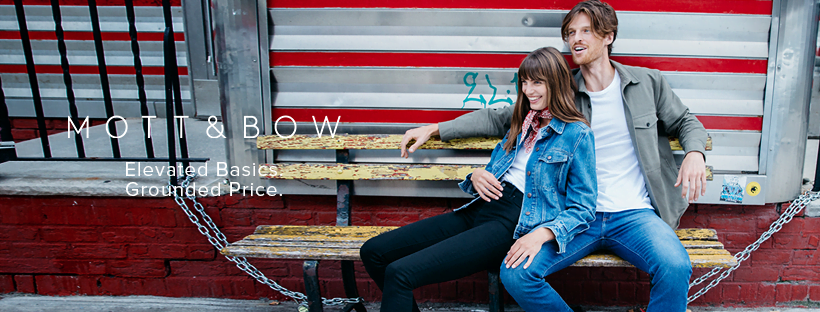
Mott & Bow wants to sell you a pair of high-quality jeans that fit your perfectly for a fair price. To achieve this, they’ve created a vertically integrated family-owned Honduran company which sells directly to the consumer to avoid intermediary mark-ups. They give customers many styles to choose from with guidance as to which might provide the best fit. Taking that one step further, they allow you to try on as many pairs as necessary until you find the size and style that you love.
- Pricing, Sizing & Customers: Their jeans start at $96. Men’s sizes go from 28-42 with inseams of 30, 32, and 34. Women’s sizing goes from 24-33 with inseams of 28, 30, and 32.
- Styling: Men can choose from straight, slim, or skinny styles, while women have a choice of slim boyfriend, mid- or high-rise skinny, or mom jeans. They pride themselves on the stretchability of their denim which they source from some of the best mills worldwide (including OrtaAdalou denim from Turkey). Their denim has 4-way stretch as opposed to most denim that only stretches horizontally. Color choices include dark and medium blue, gray, and black.
- Transparency & Sustainability: They use a resin process that must be heat cured. Distressing is done by hand through rubbing. Stone washed looks use either pumice stones or silicone balls, and they tie and knot the jeans before they put them into the washing cycle.
Armed Angels
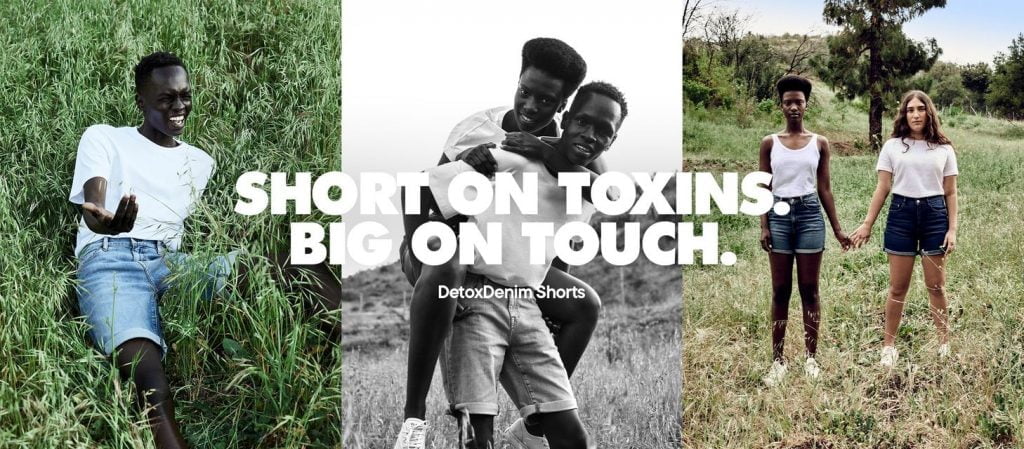
Armed Angels is a German company that stresses undyed and circular denim. They say their circular denim is “waste new”. They use 20% recycled organic ARMEDANGELS cotton which is also vegan. To make these jeans recyclable, they are designed to be easy to dismantle by having unscrewable buttons, badge and labels printed on the garment. They replace the rivets with embroidery and the waist rider is made from fabric waste.
- Pricing, Sizing & Customers: Men (29/30 – 36/34), Women (25/32 – 32/34) and Unisex. Jeans start at €75 ($90).
- Styling: They offer skinny, straight, mom, Boyfriend, wide leg fits for women. Men’s styles come in slim, straight, and tapered fits. Special collections include Detox Denim and Circular denim styles as well as shorts, skirts and jackets as well as completely undyed clothing.
- Transparency & Sustainability: They have reduced their carbon footprint by 61% compared to conventional jeans. They use TejidosRoyo’s Dry Indigo® technique for dying which uses no water, 89% less chemicals, and 65% less energy. Their DetoxDenim uses zero toxic materials for their solvents and dyes, along with GOTS organic cotton. They use laser and ozone washing technology to lighten and soften their denim which eliminates volatile chlorine-based bleach salts from the environment and factory workers’ lungs. They are Fair Trade and Fair Wear certified.
- Recycling: They accept old ARMEDANGELS t-shirts or denims to be processed into new high-quality fibers and send customers a 5 Euro voucher.
Citizens of Humanity
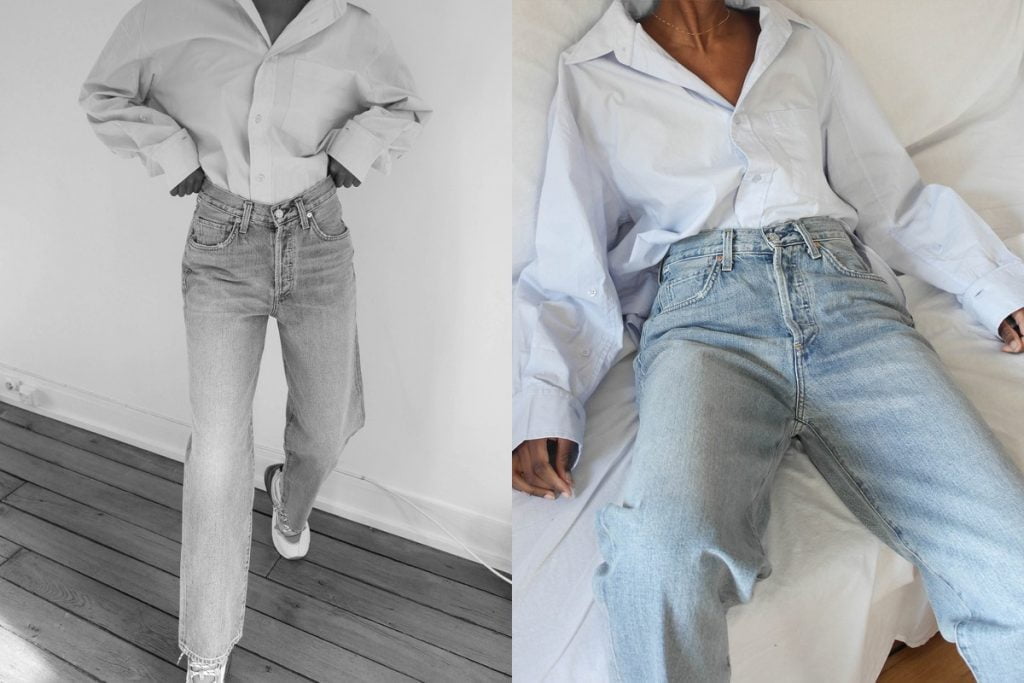
Citizens of Humanity is a premium denim company that has a devoted commitment to producing the highest quality denim. They manufacture their jeans in company-owned facilities or with select production partners. They are a vertically integrated company. Each pair of jeans passes through the hands of at least forty skilled craftsmen.
- Pricing, Sizing & Customers: Men’s (28-40 / XS-XXL) and women’s (22-34 / XS-XL / 0-14). Their jeans start at $198.
- Styling: Women’s jeans fits include skinny, slim, straight, bootcut & flare, boyfriend & relaxed fit, wide leg, cropped, petite and long in mid or high-rise. Men’s jeans come in skinny, slim (standard or tapered) and classic (tapered, classic, or regular straight), and long fits. Obviously, there are styles and fits for every taste. For women, there is also a Premium Vintage Collection designed to create modern fits yet have a vintage look. Men’s premium jeans are in the Perform Collection which is engineered and designed for durability and comfort. They use stretch denim that has technical properties including power-stretch and high-recovery, to moisture wicking, quick dry, antibacterial and temperature control.
- Transparency & Sustainability: They cut their denim on automated machines to maximize efficiency and minimize fabric waste. Each pair of jeans is handcrafted by their sewing experts. To reduce water usage they use laser technology, their own ozone process, and high efficiency washers.
- Causes Championed: They are currently partnering with maternal health non-profit, Every Mother Counts, on limited edition t-shirts in honor of Mother’s Day by donating 100% of the retail selling price. Their mission is to make pregnancy and childbirth safe, respectful, and equitable for every mother.
Outland Denim

Outland Denim is an Australian company founded to create employment opportunities for women survivors of sex trafficking. Their factory is in Cambodia.
- Pricing, Sizing & Customers: They offer men’s and women’s denim clothing. Men’s sizes go from 28/32 – 40/32 (actual waist measurements are from 31”– 43”) and cost $195. Women’s sizing ranges from 24-38 in single inch increments with 2 inseam lengths of 28 and 30. They start at $200.
- Styling: They currently offer two men’s styles: relaxed slim tapered, and slim cut. They are made of organic cotton with just a bit of stretch from 2% elastane. Their materials are 100% vegan and finished with water, energy, and chemical reducing technology. Women have a choice of 7 styles with several colors of each. Depending on color, they are either stretch (98% cotton and 2% spandex), 435 CLY (40% recycled cotton, 17% organic cotton), or 60% organic cotton, 40% Refibre. High-rise styles come in regular, girlfriend, or skinny. Mid-rise comes in skinny, flare, vintage wide leg, or boyfriend styles. They are also featuring a new collection – Spell x Outland Denim – for women that features vintage looks (jumpsuits, shorts, skirts, shirts, and more fashion forward jeans.)
- Transparency & Sustainability: They use organic cotton that has not been exposed to agrochemicals. This is grown, spun, dyed and woven in Turkey. They have a Suppliers’ Code of Conduct that defines the minimum standard of ethical and responsible behavior that all their manufacturers and suppliers much meet. They also have an extensive sustainability report that can be downloaded. They list the amount of natural raw materials they use, their supply chain traceability, and how much water, energy, and chemicals have been saved in the wash and finishing facility compared to conventional methods. They are B-corp certified and received an A+ from the 2019 Ethical Fashion Report.
- Causes Championed: They have launched an onsite Health Clinic and Education Center. They care deeply about their workers, and they especially want to protect their female employees by providing victims of sexual exploitation and other vulnerable backgrounds a living wage, education, and training to increase their standards of living and provide a stable career.
Sustainable Brands that also carry Denim
Prana

Prana is at the forefront of sustainable clothing. They carry a full line of men’s and women’s clothing and is a good resource for most wearable needs.
- Pricing, Sizing & Customers: Jeans start at $89. Men’s sizing runs from 28-42 with inseams of 28, 30, 32, 34, and 36. Women’s in sizes 2-18 (waist 24”-37”) with short, regular, and tall inseams (29”, 31”, 33”). There are is also a limited selection of plus sizes in 18-22W.
- Styling: Each style of denim comes in a variety of colors including browns, khakis, blues, grays, white, and additional colors such as green or dark umber. They use organic cotton with either polyester or recycled polyester and lycra or spandex for stretch. There are at least 6 styles each for men and women, most are skinny or straight leg.
- Transparency & Sustainability: Most of Prana’s clothing is Fair Trade and they are actively working to reach 100% by 2028. They are a bluesign® company, and members of Chetna Coalition (organic cotton farmers in India), Fair Labor Association, Sustainable Apparel Coalition, and the Textile Exchange. They use recycled materials wherever possible and are adamant about humane conditions for animal-based products.
- Causes Championed: They consistently contribute to other organizations including 5 Gyres which fights plastic pollution, Canopy which protects forest, species, and climate, and Outdoor Outreach the introduces children from under-resourced communities to outdoor recreational activities.
Organic Basics

Organic Basics is a Danish company that offers a complete line of clothing, including denim in the basic 5 pocket style. They focus on circularity so there are no synthetic blends.
- Pricing, Sizing & Customers: Men’s and Women’s jeans are all $150. Men’s sizes go from 30-36 with inseams running from 31 ½ – 34 ½”. Women’s comes in 26-34.
- Styling: Their men’s and women’s jeans are both mid-rise, slim fit jeans and come in 3 colors: washed, rinsed, and black. They also have a chino style that is baggier with side slash pockets. They use GOTS certified organic cotton, and some styles also have a bit of recycled cotton.
- Transparency & Sustainability: Each product page gives an impact index that shows how much CO2, waste and chemicals were prevented compared to conventional cotton and traditional practices. Their clothing is ethically made and PET “Vegan Approved”. They work with producers and manufacturers in Portugal, Italy, Austria, Turkey, and Scotland. The site gives a detailed profile of each factory.
- Recycling: They design all their clothing with recyclability in mind. They also offer carbon offsets for their shipping.
- Causes Championed: They have established the Organic Basics Fund to help fight climate change, restore biodiversity, and protect vulnerable communities. They directly fund people, groups and projects that address environmental and social injustices with the hope of creating long-term, real impact. Funded groups include WWF, Danmarks Naturfredningsforening (restoring habitat for pollinators, Amazon Watch, Green Kayak, and Rewilding Europe.
Outerknown

Outerknown is renowned for their sustainability, especially for their swim trunks and blanket shirts. They do, however, also make jeans. They plan on being completely circular by 2030 and work to repair, resell, and recycle their clothing so nothing ends up in landfills. The S.E.A. (Social Environmental Accountability) jeans are guaranteed for life.
- Pricing, Sizing & Customers: They make men’s (sizes 28-38, inseams 30, 32, 34) and women’s S.E.A. jeans in 24-32 that start at $128.
- Styling: Their jeans are made from organic cotton. Men’s styles come in slim, straight, and tapered fits and in 7 colors. They even have selvedge and vintage selvedge jeans available. Women’s come in high rise slim or skinny, boyfriend fit, and selvedge crop styles. Some styles come in fewer colors – mid and light wash, but they do have a bit of Coreva™ (natural rubber) stretch.
- Transparency & Sustainability: Their jeans are made at the world’s cleanest denim factory (Candiani) so there are fewer chemicals, less water, and all waste is recycled. Stretch with Coreva is one of their new technologies. Their selvedge denim comes from Kaihara, a Japanese mill started in 1893 with a history of indigo dying. They also use ISKO denim, from Turkey. All their garments are sewn in Los Angeles in a Fair Trade certified factory and guaranteed for life. Their S.E.A. pants use plastic buttons made from waste plastic collected from the ocean. They have partnered with Levi’s to create the limited-edition Levi’s Wellthread x Outerknown jeans for the past 5 seasons.
- Recycling: Outerknown is known for their recycling efforts, especially for making their famous swim trunks from recycled plastic and even merino wool.
- Causes Championed: They have supported the Ocean Conservancy through the proceeds of their advocacy t-shirt sales and participate in beach cleanups with their retailers.
Brands for Women
Able
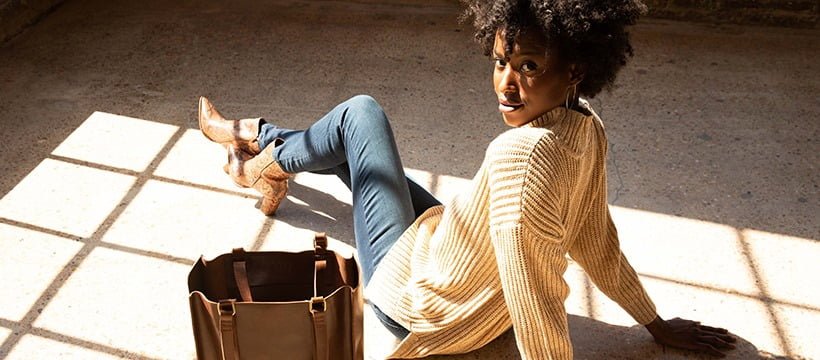
Able supports female artisans around the world. They are also the first jeans manufacturer to publish their wages on their website. They provide the highest level of transparency while featuring stylish choices with the right amount of stretch.
- Pricing, Sizing & Customers: women’s jeans starting at $85. Sizing runs US 00-14 or 24”-32”. They give front rise, inseam and back rise measurements for each style.
- Styling: Vintage inspired (mid-rise, fitted through hip and thigh with straight leg and a cropped raw hem), The Boyfriend (non-stretch, high-waisted jeans), straight high rise, wide leg (high-waisted and relaxed through hip and thigh in stretch and non-stretch) slouchy (sits low on the waist, slouchy through hip and thigh, relaxed slim leg), classic skinny (stretch).
- Transparency & Sustainability: Their denim is sourced in Mexico where their vendor recycles 100% of their water. They use ozone production processes to reduce water usage. They are currently getting WRAP certified. They use potassium permanganate whenever possible to avoid hasher chemicals and enzymes to act as biocatalysts. All water is recycled and cleansed before being released. Denim scraps from cutting and sewing are given to the government for housing insulation. Shipping and packaging are recycled and recyclable.
- Recycling: They offer unlimited free exchanges until you find the perfect fit.
- Causes Championed: Fair Labor, women’s empowerment.
Bella Dahl
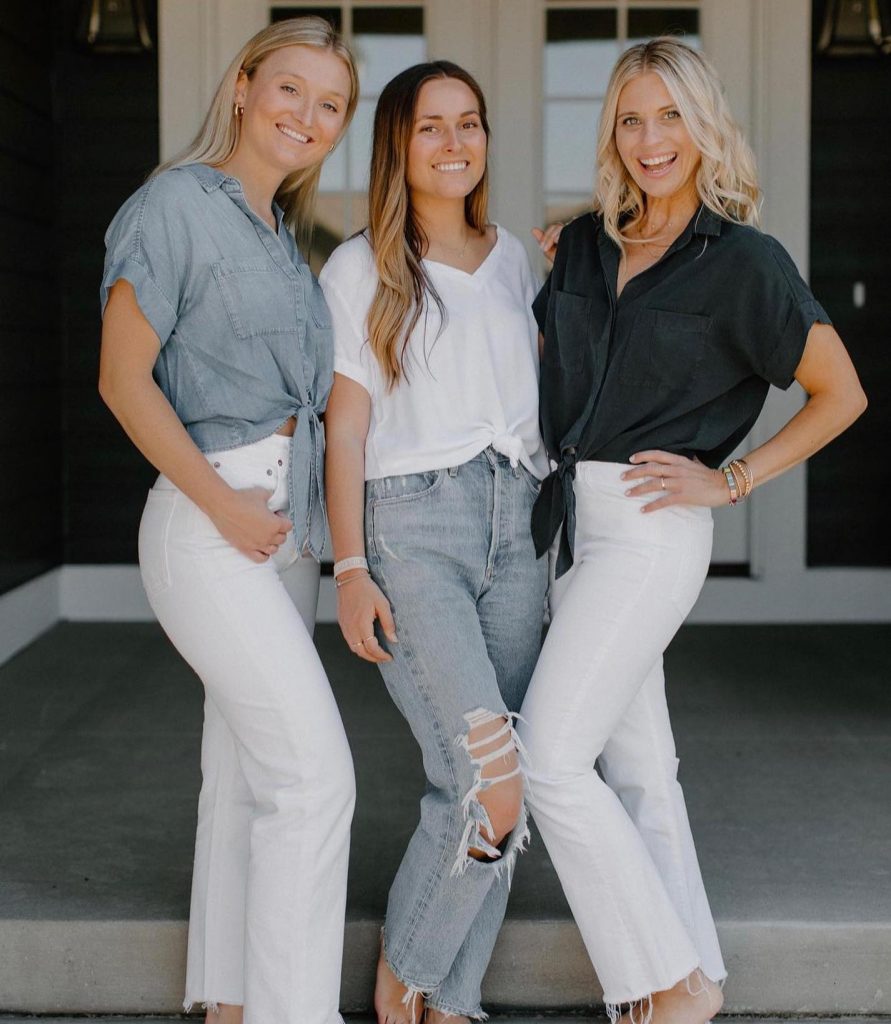
Bella Dahl is a Los Angeles based company that offers effortless, yet sophisticated styles. Their denim fabric incorporates Lyocell™ from closed loop processes and sourced from sustainably managed raw wood. They use a unique wash process to create softer fabrics with a sleek finish that have a much lighter hand and a flattering drape. The company features many other plant-based, sustainable fabrics such as cupro and linen.
- Pricing, Sizing & Customers: Women’s sizes XS – XL. A Denim shirt starts at $120
- Transparency & Sustainability: They garment dye each piece of clothing rather than fabric dye. This allows them to control the number and quality of the resources that go into each style.
Boyish

Boyish is a Los Angeles women’s line based on vintage silhouettes with a modern update. They are inspired by the stylish women who often describe their personal style as “Boyish”. They focus on product quality, feminine fit, and authentic washes.
- Pricing, Sizing & Customers: Women’s in sizes 22-32. Prices start at $158
- Styling: Styles for jeans include crop flare, flare & wide leg, high waisted, skinny, straight, and stretch in at least 11 colors. They use OCS 100 Certified organic cotton, recycled cotton, vegan denim, deadstock fabrics, with some of their cotton blended with Tencel. They use only non-GMO GOTS certified organic cotton and plant-based, low impact dyes.
- Transparency & Sustainability: Each page lists the positive impact of the product in terms of days of drinking water saved, square feet of land farmed without pesticides, miles of emissions avoided, and number of trees planted. Their processes use only 1/3 of the amount of water that regular denim uses and they recycle and clean all water before it is released to ensure there are no harsh chemicals. They work only with fabric mills and factories that are part of the ZDHC Program. They use recycled fabrics exclusively and all hangtags, hardware, and polybags for shipping are considered for their minimal impact on the environment. They are OEKO-TEX Standard 100 approved, use Dystar indigo which contains 80% less sulphates, natural plant-based dyes and dip their fabric fewer times to conserve energy and water. They use only cold water, laser machine finishing, wash their fabrics with vapor water to save water and energy, create stone-washed looks using nano bubbles, ozone washing to bleach, and use the natural enzyme made by Nearchimico instead of potassium permanganate. Stone wash finishes are made with faux pumice stones. They have been, and continue to be, carbon neutral. Other certifications include PETA Vegan approved, Global Recycled Standard, ISO9001 Certified, Climate Neutral Certified, and Carbonfree Partner.
- Recycling: They’ve designed their jeans to be recycled into new products at the end of their life. They recycle all their cutting waste to either new fabrics or recycled industrial uses. They use the closed-loop technology of Re:Newcell to recycle stretch fabrics. Their metal buttons, rivets and hardware are made with recycled metal. Their shipping materials are 100% compostable and break down in less than a year.
- Causes Championed: All their suppliers, from farms to factories, much sign their Code of Conduct ensuring honest, fair wages and pass in-person annual inspections as well as third party audits. They donate to 1% for the Plant, One Tree Planted, Cool to Care, Textile Exchange, Friends of the LA River, and Solar Sister.
Madewell
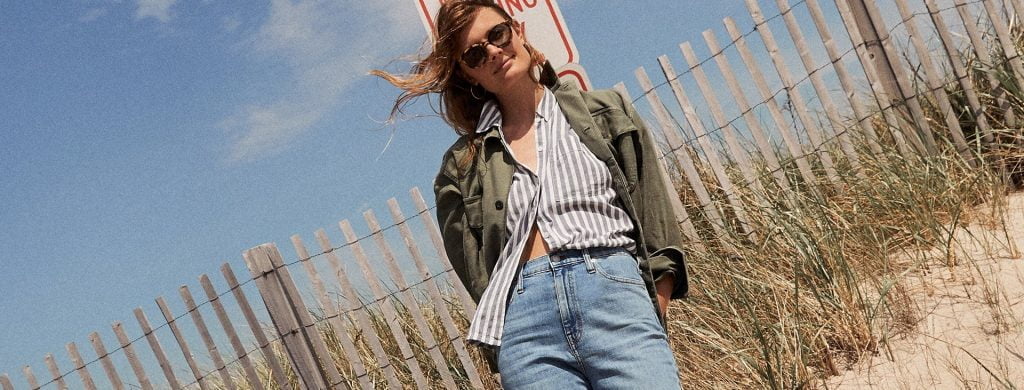
Madewell is focused on inclusivity and sustainability. They carry a full line of curvy clothing in each clothing category. Not only do they carry clothing, but also household goods, personal care, shoes, accessories, and other brands.
- Pricing, Sizing & Customers: Mostly Women’s clothing that is very inclusive. They do carry men’s denim. Their jeans start at $88. Sizes go from 23-37 and most sizes come in petite. They also have maternity, tall, taller, and plus sizes.
- Styling: Their jeans come in 8 styles: skinny, vintage, curvy, boyjeans, wide leg, straight, demi boot, and flare. In addition to 3 blue shades, they have black and white, as well as some colored jeans. Rises come in low, mid, high, and extra high. Fabrics can be rigid, soft, super soft, stretch, etc.
- Transparency & Sustainability: They are a Fair Trade company who prides themselves on treating their employees and being inclusive. Their goal is to be carbon neutral by 2030. They use recycled cotton, are part of the BCI initiative, use EcoVero and Tencel to reduce their environmental impact, and use eco-friendly production methods like lasers.
- Recycling: They will help you repair, reuse, or recycle your jeans. If you bring your jeans to their store they will patch or mend them. If you wish to resell them, they have teamed with ThredUp to make that possible, and have an Archive program where you can purchase pre-owned Madewell jeans at some of their locations. They recycle unusable jeans into housing insulation. To date, they have donated 800,000 pairs of jeans, keeping 415 tons from becoming trash and insulating 1,000 homes.
- Causes Championed: In addition to donating clothing samples to Cotton’s Blue Jeans Go Green™ program, Good 360, and Fab Scrap, they have periodic special events or sales where the proceeds go to LGBTQ advocate Love to All, the National Forest Foundation, or female empowerment group Girls Inc.
Reformation
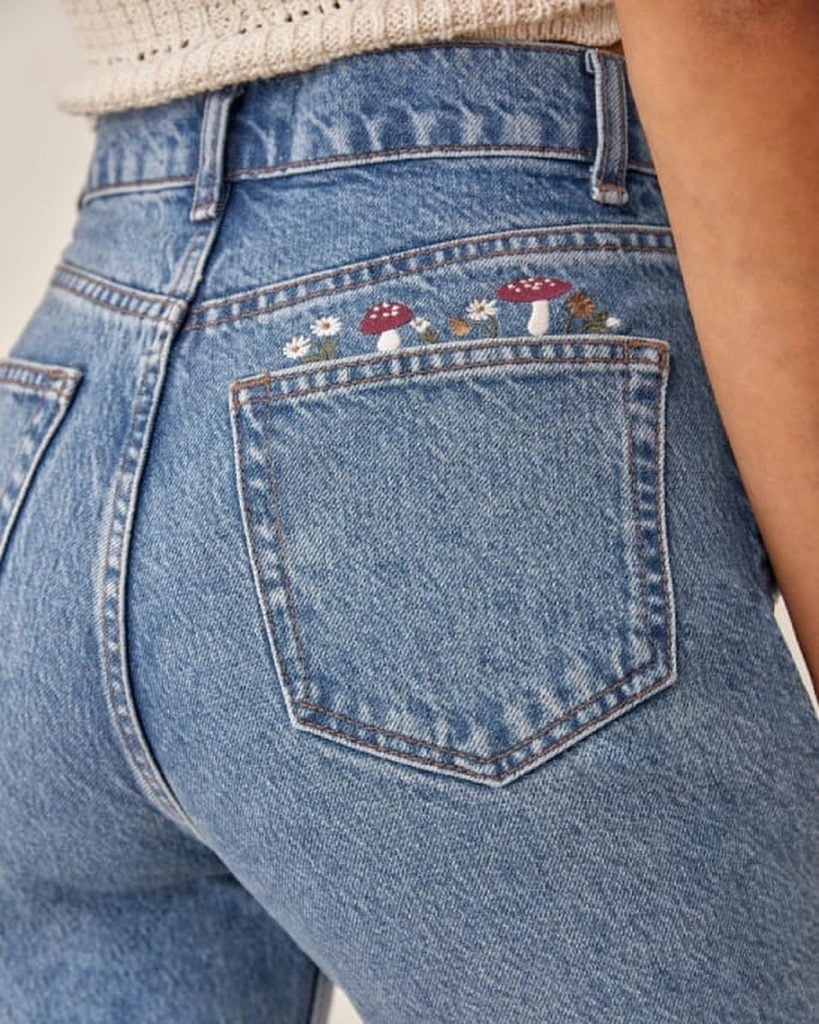
Reformation is a Los Angeles women’s clothing company that sells everything from casual to formal (wedding) clothing to shoes. They want to celebrate the female form. They offer a greater variety of denim options than most sustainable companies including a variety of printed denim jeans, and colors such as pink.
- Pricing, Sizing & Customers: Women’s jeans are in sizes 22-31 (single digit increments) and prices start at $118.
- Styling: Their sustainable jeans come in skinny, straight, tapered, relaxed, wide leg, cropped, bootcut, flare, and shorts. Waists are mid, high, and super high rise; leg styles are relaxed, straight, and wide leg. You can choose from white, light, medium, dark, black, printed, or colored jeans. The denim is either rigid, comfort stretch, or super stretch.
- Transparency & Sustainability: In general, their jeans are sustainably made, but if you are really interested in their supply history, they have introduced their FibreTrace™ collection that embeds traceability technology into the fiber through the entire lifecycle of the jeans. All of Reformation’s denim comes from Good Earth Cotton, the world’s first climate positive cotton farm in Australia. Each product page gives a sustainability impact summary of carbon dioxide, water, and waste savings, as well as a detailed description of the pant including rise, inseam, and leg opening dimensions. Their dedication to sustainability includes investing in green building infrastructures to minimize waste, water, and energy footprints. There are extensive sustainability reports for the past 5 years available. They have been carbon-neutral since 2015, are bluesign certified (with an A+ in textile dying) and OEKO-TEX Standard 100 certified.
- Recycling: Reformation was originally founded as a vintage clothing seller. They now recycle, compost organic wastes (currently 75%), and recycle or donate their textile scraps whenever possible.
- Causes Championed: They joined the Ellen MacArthur Foundation’s Jeans Redesign initiative in 2019. They also purchase environmental offsets, so they’ve partnered with Native Energy and the Bonneville Environmental Foundation Water Restoration Program. They also support a project in India that encourages clean energy, helped install water filters for houses in Honduras, and contributed 140 million gallons of freshwater to critically dewatered areas in California.
Sézane

Sézane is a comprehensive women’s clothing company that offers a line of eco-friendly denim based in Paris.
- Pricing, Sizing & Customers: Their jeans start at $125 and in sizes 24-35 or 2-14, as well as maternity (24-35).
- Styling: Sézane offers a greater variety of styling than most jeans options. There are buckled, gathered, or double button styles in mid-high or high waisted; straight, slightly tapered, or paperbag cut; wide leg or slightly flared. Most styles come in a variety of colors including ecru and black.
- Transparency & Sustainability: They are OEKO-TEX certified, use some GOTS certified or mostly organic cotton, and recycled polyester or elastane for stretch. Water used during production is recycled and their eco-friendly washing process consumes 2 times less water than traditional washing methods. They work with long-term trusted partners that are audited annually to ensure their sustainability.
- Recycling: The have launched a program that has recycled more than 13,000 pieces of clothing.
- Causes Championed: They support dozens of charitable organizations that champion children through their DEMAIN program. It is funded by a new product that launches on the 21st of each month. The full amount of that item’s sales, as well as 10% of all of that day’s revenue, is donated to the program. To date, 4 million euros have been raised.
Brands for Men
Bluer Denim

Bluer Denim is a Portland-based company that manufactures in Los Angeles. They started by making promotional t-shirts made by adult orphans in Haiti who were given training and fair wages. They expanded their enterprise when the founder purchased a denim company. Warning…their selection is currently limited and sales are final.
- Pricing, Sizing & Customers: Sizing ranges from 28-40.
- Styling: Classic straight or modern slim jeans. It appears that jeans are limited to men’s in raw indigo or black selvedge styles.
- Transparency & Sustainability: They are a carbon neutral company that purchases carbon offsets from Terrapass. Each pair of jeans comes with a serial number so customers can track the exact location of where the denim was sourced, cut and sewn.
- Recycling: They will recycle your old denim through their Denim Rescue program. At check-out, just click a button to add Denim Rescue to your cart and they will send you an envelope. Once you send old jeans back, they’ll email a $10 credit toward your next purchase. Returned jeans in good condition are washed and delivered to a Pacific Northwest shelter. Otherwise, they are recycled into insulation. They will soon have the capability to recycle old jeans into new selvage denim. They also recommend Indigo Proof for those who want to repair their denim so any rips are invisible.
- Causes Championed: They are members of 1% for the Planet and donate to environmental and non-profit organizations. They are passionate about waste reduction and community care.
Buck Mason

Buck Mason makes classic men’s jeans using long-staple cotton sourced from the growers. They offer their American workers fair working conditions. They build their wardrobe essentials for durability based on classic styles. They are also known for their t-shirts, and actually knit their own fabric.
- Pricing, Sizing & Customers: Men’s jeans in sizes 28 – 40 starting at $95.
- Styling: Jeans come in 5 or 6 colors including natural whites, khaki, greys, greens, blues, and blacks. Some styles do come in raw and selvedge denim. They have natural, light, medium, and dark washes. And styles include the standard fit (mid-rise relaxed, tailored fit) or slim (mid-rise slim and tapered fit). Some of their denim comes from Japan. Their pants have a bit of spandex for comfort and stretchability.
- Transparency & Sustainability: Their site gives extensive details about the features of each item, it’s sourcing, and how they run their factories.
Made to Measure
Lasso
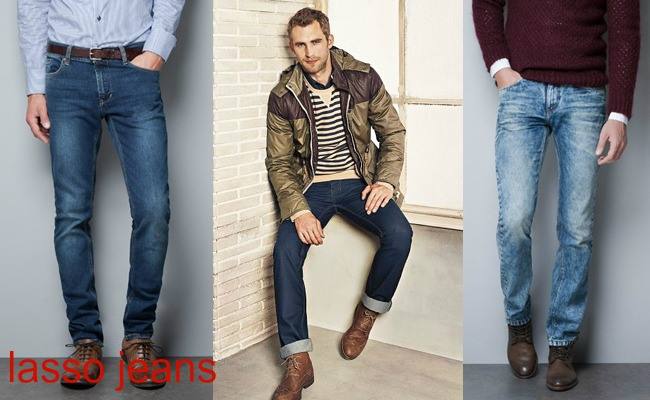
Lasso makes jeans that are made to measure. This is the perfect choice for those who don’t fit into standard sizes. You can say goodbye to gapping waists or too small thighs. Pick your style and after placing your order you’ll receive an email from their fit expert. They’ll ask you to take measurements using a tape measure. (Don’t worry, if you don’t have one, they’ll send you one). They’ve found that the tape is much more accurate than apps. You’ll receive your custom Lasso jeans in approximately 2 weeks. (They also have free 2-day shipping!)
- Pricing, Sizing & Customers: Men and Women with most priced at $189. (Selvedge is slightly more.)
- Styling: Women’s styling includes Vintage wash in light and dark that are high rise straight legged (this is a slightly sturdier denim), Classic in stretch and non-stretch denim in classic blue, deep blue, jet black or optic white in high-rise skinny, straight leg, wide leg, or mom jeans. Men can choose from slim or straight styles in comfort stretch denim in the same four washes or Vintage denim which is available in only the light color. They also offer raw Japanese selvage Lasso’s in slim and straight for men.
- Transparency & Sustainability: They list their denim suppliers from around the world (some of which you may recognize from other brands). They use laser technology to cut the denim for each pattern made. There is no overproduction and waste because they only cut after your order is placed. They package using 100% recycled boxes.
- Giving Back: They’ve partnered with the CfRN (Coalition for Rainforest Nations), a leading charity for environmental stewardship that helps avert the greenhouse gasses produced by creating each pair of jeans by planting trees where they are needed most.
Unspun

Unspun is an American made-to-order denim brand. Part of what makes them sustainable is that they don’t hold inventory, thereby reducing waste. They have stores in San Francisco and Hong Kong. You can ensure your fit either in-store or by using your phone paired with their technology which creates a digital avatar with over 30,000 dots of infrared light for a hyper-accurate 3D body model.
- Pricing, Sizing & Customers: Men’s women’s, and unisex. The price starts around $200.
- Styling: When building your jeans you choose the style, fabric (10 total), waist rise (low, mid, high, ultra-high), leg length (crop, regular, rolled), and even the color thread. They offer slim, tapered, relaxed, and loose fit styles. There are 5 fabric choices of high stretch or mid-stretch (the colors vary between the stretches). Although white thread is the most sustainable choice, there are also 4 others to choose from. They have a new collection of Loose Fit jeans for men and women in either vintage or regular versions.
- Transparency & Sustainability: They use recycled cotton and no plastic materials. Everything is biodegradable except the touch of lycra in some of their fabrics.
- Causes Championed: Their goal is to reduce global carbon emissions by 1% through automated, localized, and intentional manufacturing.
Upcycled Denim
Many of the companies listed above have created resale shops for their brands and even more are creating new “vintage” jeans. Listed below are a few companies that take pre-owned jeans and upcycle them for today’s market (many are Levi’s 501s). You can also check out Levi’s SecondHand page on their site.
Ateliers & Repairs

Ateliers & Repairs re-engineers and re-designs reclaimed garments and textiles. They partner with other brands and manufacturers to create a circular system that creates a new standard for environmental impact and transparency. Among others, they have a partnership with Cardiani. They use Re-Gen, a 100% regenerated denim composed of 50% Refibra™ (recycled cellulose fibers) and 50% recycled cotton. This denim has no raw cotton.
Ateliers & Repairs also works with Levi’s to upcycle their 501 jeans. Each pair is unique with patches, stitching, and some hand stitched repairs that start at $375. Another style of 501s has a side strip of fabric from various colorful scraps as well as hand stitching. Each pair of pants is individually refashioned and unique.
Re/Done
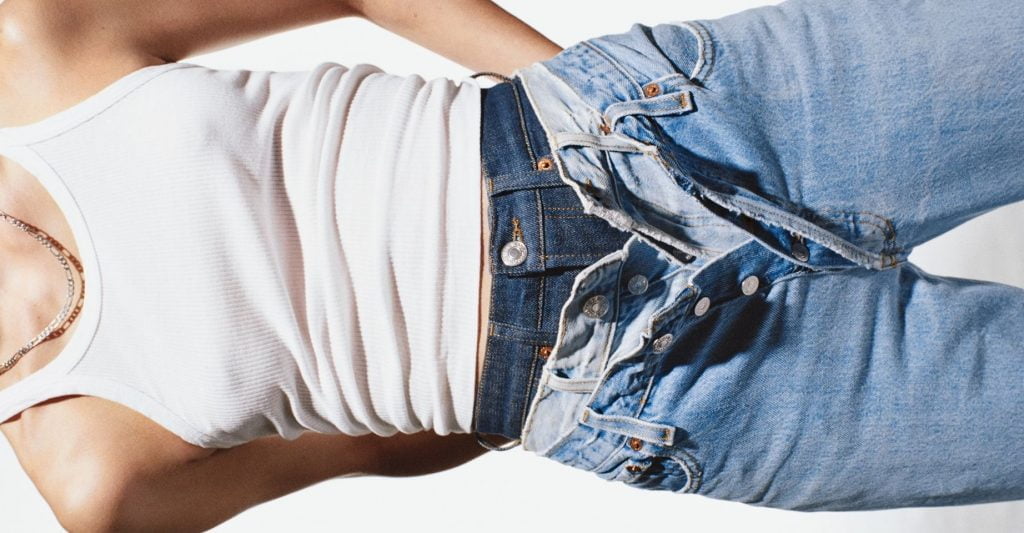
Re/Done is another upcycler of Levi’s jeans for women. They have a wider selection with skinny, straight, wide & flare legs and shorts. They have a greater size range of 23-32 and assorted colors to choose from. Their jeans are tailored and trimmed to accommodate modern fit preferences. They also upcycle some of their clothing by creating patches or adding embroidery. Upcycled jeans start at $320. They have a Re/Done Re/Sell shop where you can resell your clothing, regardless of original purchase location, for an 80% store credit. The remaining 20% is donated to Sheltersuit, a non-profit using upcycled materials to create coats that transform into sleeping bags for the homeless.
E.L.V. Denim
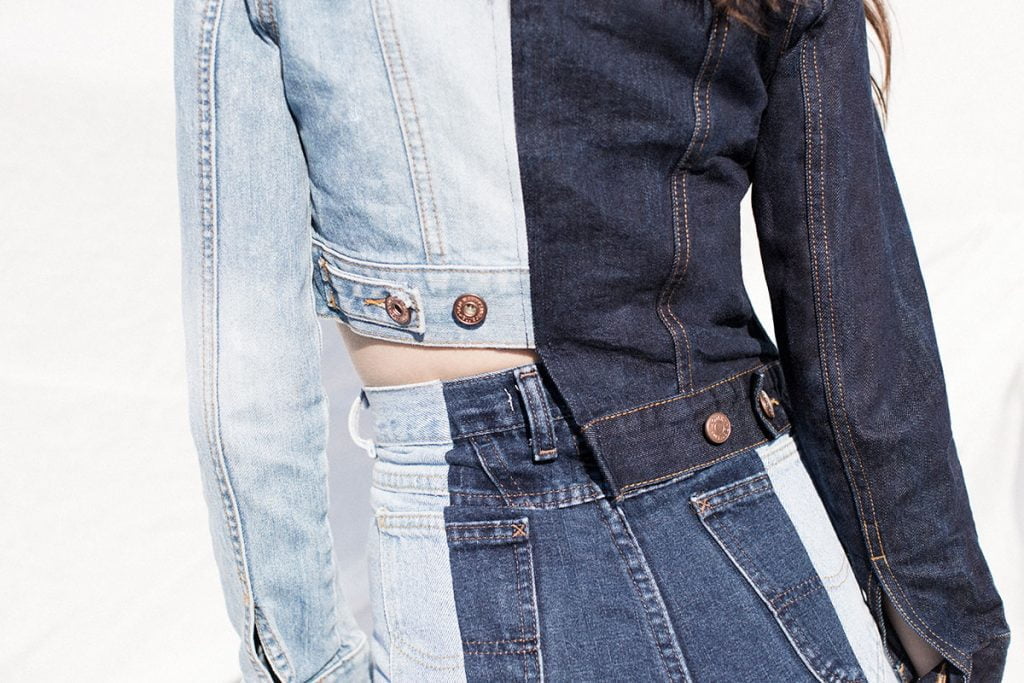
E.L.V. Denim is a zero waste and sustainable company based in London. They believe in complete transparency. They take unwanted jeans and turn them into modern sophisticated pieces. They start by sourcing their jeans from vintage warehouses around the United Kingdom. Every piece is first washed, by a local launderette that only needs 7 litres of water. A local Atelier cuts the jeans by hand and they are then remade. Any scraps are given to the artist Ian Berry who uses them to create his ‘paintings”. They also donate fabric to local schools and universities for their textile classes.
E.L.V. Denim offers men’s and women’s clothing. Pricing starts at $345 (£245) and jeans come in a variety of colors and styles (women’s comes in boyfriend, flare, and straight leg styles). They offer single colored clothing and Contrast styles (they take two different garments and sew ½ of each together.)
Everything Blue Jeans: Final Thoughts
What started as a single utilitarian item of work clothes as transformed into an international phenomenon for all. Innovation has been fueled by those concerned about the environment, and new styles have emerged, become fads and faded only to re-emerge later.
Jeans are at a bit of a crossroads right now. The popularity of super skinny jeggings is waning and looser fitting jeans are becoming more popular. As with all previous times of transition, any and every style can be found in every color and expanded sizing. These are great times for jeans lovers, especially since so many manufacturers have embraced sustainable practices. Jeans without guilt – what could be better!
References
Books
The Golden Thread: How Fabric Changed History, Kassia St. Clair, Liveright Publishing 2018.
Articles on Raw & Selvedge Denim
https://kato-brand.com/pages/what-is-selvedge-denim
https://www.artofmanliness.com/articles/raw-selvedge-denim-introduction/
https://toddshelton.com/blog/products/jeans/selvage-denim
https://www.highsnobiety.com/p/raw-selvedge-denim-beginners-guide/
https://manofmany.com/fashion/mens-fashion-trends/best-japanese-denim-brands
https://www.heddels.com/2011/03/the-rundown-on-selvedge-denim-what-is-it-all-about/
https://denimhunters.com/denim-wiki/denim-explained/selvedge/
Sustainability Information about Denim
www.thefactshop.com/fashion-facts/denim-jeans-facts
Denim Stats You Didn’t Know | thrEDIT (thredup.com)
Microfibers From Blue Jeans Are Polluting Arctic Oceans | Smart News | Smithsonian Magazine
Are My Denim Jeans Bad for the Environment? | NRDC
How Do Denim Jeans Cause Pollution? Envirotech Online (envirotech-online.com)
The Environmental and Human Cost of Making a Pair of Jeans – EcoWatch
How Crescent Bahuman Masters the Measurement of Sustainable Denim – Sourcing Journal
From Denim to Hosiery: How Interloop Manufactures Apparel Responsibly – Sourcing Journal
How to Make Sustainable Denim Jeans (bloomberg.com)
Tommy Hilfiger launches first circular denim collection (fashionunited.com)
Fred Segal Turned Jeans Into Hot Fashion in the Early 1960s – WSJ